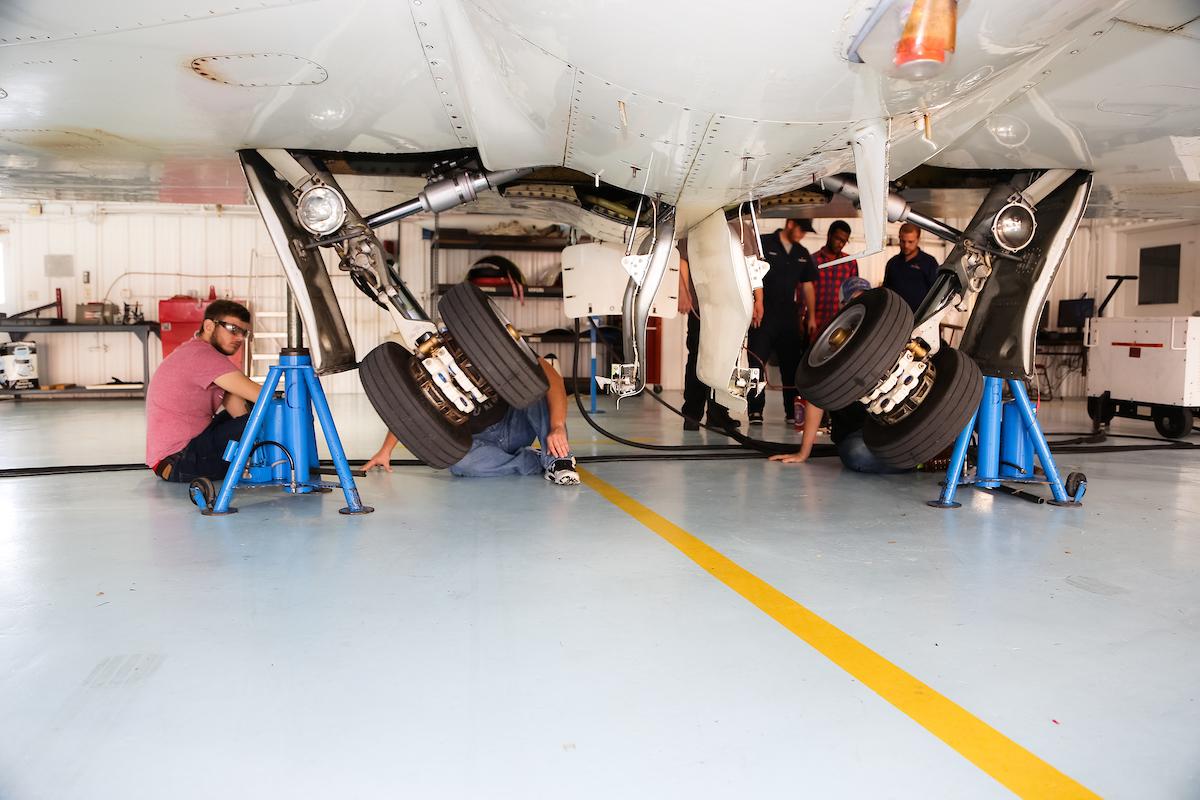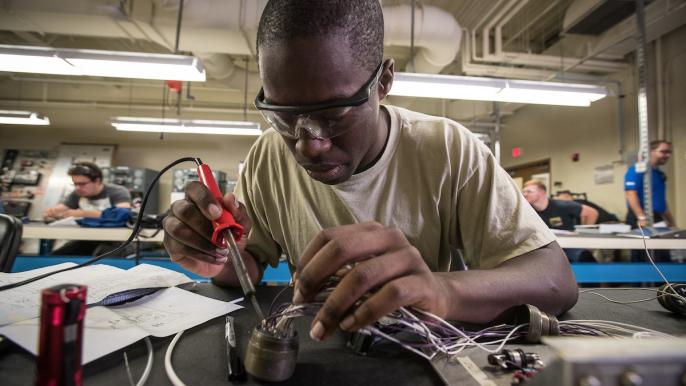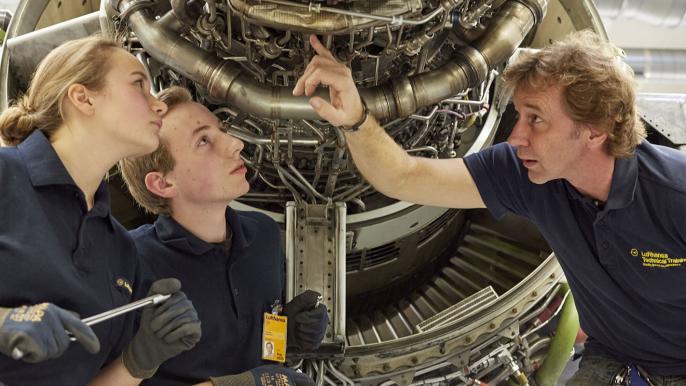How Aviation Maintenance Schools Are Coping With The Coronavirus Crisis

As the aviation industry reels from the COVID-19 crisis and schools worldwide begin closing their doors until further notice, aviation maintenance technician schools (AMTS) and training programs are doing their best to cope with the unprecedented situation.
On March 12, FAA issued special guidance (Memorandum M350-8000.1-G-2003-0716) to AMTS providing a variety of recommended options for schools to remain in compliance with the requirements of Part 147 during the ongoing crisis. For schools with the ability to implement distance learning programs via technology such as video or telephone conferencing, suggested options include expansion of existing FAA-approved distance learning programs or requesting authorization of temporary distance learning programs. Other options include suspending AMTS operations entirely for time periods determined by local authorities, temporary revision of a school’s allowable hours of absence or schools submitting alternate proposals to the responsible Flight Standards office to address learning under individual circumstances.
Following the FAA memorandum, many AMTS in the U.S. posted statements online detailing their differing responses to the ongoing situation. Aviation High School in New York City is working to train instructors in online programs so students can continue studying via FAA online courses. Pittsburgh Institute of Aeronautics is closing campuses for a two-week period, with classes tentatively set to resume by early April, as it evaluates alternate methods for current classes.
For AMTS that already employed blended-format programs combining hands-on coursework with online teaching, the situation is manageable for now. According to Ryan Phillips, chair and professor of Lewis University’s Aviation and Transportation Studies program, the school is opening up additional blended-format sections for traditional students and frontloading lectures for now until the school is able to reopen in-person classes. The hope right now is for students to have the ability to make up their lab coursework in subsequent weeks, but with a projected mid-May graduation date, this could prove impossible depending on how long the COVID-19 crisis lasts.
Phillips says he hopes A&P students set to graduate this spring will not be affected, but if the school is unable to reopen in a couple weeks’ time, the university will need to reassess—potentially by offering concentrated lab sessions in summer months after the semester concludes.

At Embry-Riddle Aeronautical University (ERAU), the Aviation Maintenance Sciences department is doing its best to adapt to daily-changing requirements from the Centers for Disease Control and Prevention (CDC). According to Eric Jones, department chair, the lab component for AMTS required by FAA has been the trickiest portion of navigating the ongoing situation since it entails small groups of students working together. “We found it just impossible to comply with the CDC guidelines and continue to have classes and safely support the academic community here at Embry-Riddle,” says Jones, “so we asked the FAA if we could receive an exemption to suspend the lab portion of those classes and then take all of our lecture courses to an online format.”
Jones says FAA gave ERAU approval early this week and students began taking online lecture classes starting Wednesday. “This is an incredibly novel approach by the FAA. In fact, the way they deployed it and the expediency in which they approved it has been fantastic,” he adds. All lab classes are currently suspended and Jones says the university is working on a contingency plan for how students can fulfill lab requirements before the end of the semester.
“We’re hopeful that it’s not going to affect their graduation, but we’re always going to err on the side of safety. Rather than push these labs and get students graduated, it’s more important that we respond to CDC recommendations,” says Jones. This may entail letting students stay on campus during the summer to finish lab work.
ERAU is also hopeful that its two competition teams for the Aerospace Maintenance Competition—one being the school’s inaugural all-female team sponsored by Pratt & Whitney—will still be able to compete despite the competition being pushed back until late summer. Jones says the teams will continue to practice once they are authorized to meet on campus and he fully expects ERAU to field both teams this year.
In Washington state, where more than 1,000 cases of COVID-19 have been reported, the situation is more difficult. The state has mandated that in-person instruction cannot take place until at least April 24, providing a significant hurdle for Clover Park Technical College, which has campuses in the Seattle suburbs and was set to begin its next academic quarter on April 1. According to Gregory Doyon, lead of Clover Park’s School of Aerospace and Aviation, it may be able to resume lab classes on April 24 while maintaining social distancing protocols, but getting approval to start distance learning is a challenge.
“Our state directive only allows distance or ‘alternative’ instruction to be given as we start the new quarter,” says Doyon, pointing to FAA’s March 12 special guidance. “However, all of these requests must be submitted in writing to the local Flight Standards District Offices (FSDO) and reviewed and approved at that level. For a school such as ours, that is a pretty tall order to accomplish with the few weeks remaining until our new quarter starts.”
Doyon says another complication is the memorandum’s directive that online learning “should not be used to enroll new students,” which puts things in question since the School of Aerospace and Aviation was planning to start new students next quarter as well. Clover Park is trying to move some curriculum to an online platform and is staying in touch with its FSDO primary inspector as to specifics.
“Right now, we are still planning scenarios, albeit with plenty of hand-wringing about the entire situation. We have no good solutions, and the situation may come to complete college closures at the state governor’s pleasure, so that possibility is also hanging over our heads,” he says.
In Europe, which was hit with diagnosed cases of the virus and lockdowns before the U.S., the effect on aviation maintenance training has been mixed.

At Lufthansa Technik (LHT), which runs a robust apprenticeship program and added more than 240 trainees last year, training is still running fairly normally. The MRO has put precautionary measures in place for all employees worldwide, such as handwashing, social distancing, increased use of telework or electronic communication and less business travel. A representative for LHT says the company is closely monitoring developments, but that it is hard to quantify what longer-term impacts will be on the apprenticeship program, particularly in the face of various economic mitigation measures such as the imposed hiring freeze.
Magnetic MRO’s training unit, meanwhile, has been hit hard by the effects of the crisis due to travel and quarantine restrictions imposed by local authorities, as well as its own safety measures. Since the company provides training at its Tallinn, Estonia base to technical apprentices from other countries—such as through its recent partnership with Scandinavian recruiting and training specialist OSM Aviation—there has been fear within the programs about whether trainees from outside Estonia have been properly screened and isolated. However, the company says it has taken steps to ensure employee and apprentice safety, including making sure new apprentices coming in for training have been under isolation for the recommended time frame.
“All future training has been postponed and the upcoming advertised training in April will probably be postponed if the travel restrictions remain,” says Haldi Vanatoa, head of Magnetic MRO’s training unit. “We see the downfall in training bookings because of the uncertain situation (it is difficult for trainees to plan anything at this stage).”
Vanatoa adds that reduced income due to the outbreak has impacted the business and Magnetic MRO has seen an increase in cancellations.
